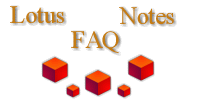
|

|
Good/Bad Uses for Notes
What Companies Use Notes For (and What They DON'T Use it For)
Notes serves such a wide variety of applications that examples exist of it being used for nearly every application. However, there is industry consensus about types of applications work or don't work and specific examples. In general, there are more uses for Notes than places it doesn't work.
Companies use Notes successfully for:
Application support request tracking
Applications that are updated frequently
Applications that need to be deployed on a variety of hardware or operating system clients or servers
Applications that need to store and mix rich text, graphics, sound, video, other OLE objects
Applications where access security is important
Audits
Bulletin boards*
Business placement in brokerage firms
Business Redesign Discussions
Call Reporting
Change Management
Combining information from various sources to aid in investment
Decision making
Communication and work across timezones
Company-wide announcements*
Compensation and Benefits management
Controlled Interchange with Internet Usenet Newsgroups
Corporate Phone Directory
Correspondence Management
Customer Support
Data Warehousing (mid-size organizations)
Directories*
Disaster planning and recovery
Distributing any unstructured information that can't be defined easily ahead of time
Documentation/reference checkout tracking
Electronic Forms and Forms routing
Electronic job postings
Electronic Mail within an Organization
Employee reference guides*
Empowering the mobile worker
Executive Information Systems
Expense Reporting
External provider information
Fax: Outbound/Inbound/Fax Back
Flexible Benefits Enrollment (also done using Phone Notes)
General discussions
Group Information Manager
Group Scheduling
Help Desk
Hotel Lists
Human Resources/Employee Tracking
Insurance Claim Processing
Inter-organization Applications and Mail Exchange
Internet Mail Gateway
Investment Applications
IP address tracking (easier to manage IP addreses than using Domain Naming Services)
IS tip sharing
Job requisition submission and tracking
Knowledgebases
Legal Case Tracking
Library catalog
Library Periodical Tracking
Loan Approval
Medical Record Imaging
Medical/Patient Case Management
Meeting Minutes
New account/customer setup and tracking
News warehouses
Outside counsel (including direct exchange via Notes with those providers) Performance Management
Personal Information Manager
Planning Discussions
Police Tracking of Criminals
Presentation databases
Problem/Incident Tracking
Procedures*
Product and service catalogs
Product Development
Project Management
Public Relations Tracking
Publishing Information onto the WWW
Purchase order systems
Rapid delivery of applications and interative prototypes
RealTime desktop-desktop collaboration using Intel ProShare
Resume and Applicant tracking
Rolodex
Sales and Lead Tracking
Sales and Marketing databases
Sales brochure ordering (Minnesota Mutual uses this to let agents order marketing materials)
Securities Agent Licensing
Sick leave tracking
Simple-Moderate Workflow applications
Skills matching and succession management
Software documentation
Software Inventory
Speech tracking (The Met keeps all of the executive's speeches in Notes)
Standards*
Status Reports
Stock purchase request tracking
Supply order tracking
Surveys coupled with an internal discussion area
Technology discussions
Time Sheet Reporting
To-Do lists
Tracking sales activity
Tracking staff availability
Training management and registration
Travel Itineraries
Underwriter evaluation for assessing the quality of risks
Underwriting
Underwriting guidelines
Underwriting inspection report requests, delivered directly to the service via Notes
Vacation tracking
* During research, these applications were also identified as suitable for successful delivery via an Intranet.
Companies don't use Notes for:
Accounting/Finance
Accounts Payable
Applications that need a lot of number crunching
Applications that require record locking
Applications with many data fields to fill in
Complex contact management and scheduling
Desktop Publishing
Enterprise-wide billing systems
Heavy reporting applications
High volume transaction-based applications, which are typically done using CICS and relational databases
Payment processing and application
Payroll
High volume point of sale applications
Realtime inventory management
Room scheduling (only true for Notes 3.x)
Very advanced or complicated workflow (only true for Notes 3.x)